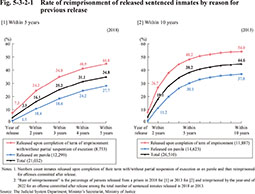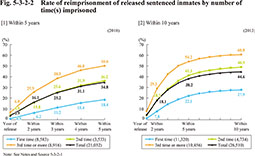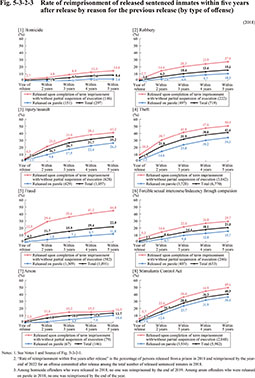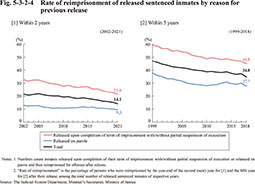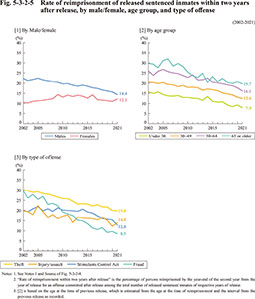Section 2 Reimprisonment of Released Sentenced Inmates
In this Section, the rate of reimprisonment means the percentage of inmates reimprisoned to serve sentences for offenses committed after release among the released sentenced inmates of a given year.
Fig. 5-3-2-1 shows the rate of reimprisonment within the period of five and 10 years after the release of sentenced inmates released in [1] 2018 and [2] 2013 by reason for the previous release (either released upon completion of the term or released on parole; hereinafter the same applies in this Section).
Fig. 5-3-2-1 Rate of reimprisonment of released sentenced inmates by reason for previous release
Click here for the Excel file (Japanese)
Fig. 5-3-2-2 shows the rate of reimprisonment within the period of five and 10 years after the release of sentenced inmates released in [1] 2018 and [2] 2013, by the number of time(s) the sentenced inmate had been imprisoned at the point of previous imprisonment.
Fig. 5-3-2-2 Rate of reimprisonment of released sentenced inmates by number of time(s) imprisoned
Click here for the Excel file (Japanese)
Fig. 5-3-2-3 shows the rate of reimprisonment within the period of five years after the release of sentenced inmates released in 2018, by reason for the previous release and type of offense.
Fig. 5-3-2-3 Rate of reimprisonment of released sentenced inmates within five years after release by reason for the previous release (by type of offense)
Click here for the Excel file (Japanese)
Fig. 5-3-2-4 shows the trend in the rate of reimprisonment within the period of [1] two years and [2] five years after release, by reason for the previous release.
Fig. 5-3-2-4 Rate of reimprisonment of released sentenced inmates by reason for previous release
Click here for the Excel file (Japanese)
Fig. 5-3-2-5 shows the trend in the rate of reimprisonment within the period of two years after release during the years of 2002 -2021, [1] by male/female, [2] by age group and [3] by type of offense.
Fig. 5-3-2-5 Rate of reimprisonment of released sentenced inmates within two years after release, by male/female, age group, and type of offense
